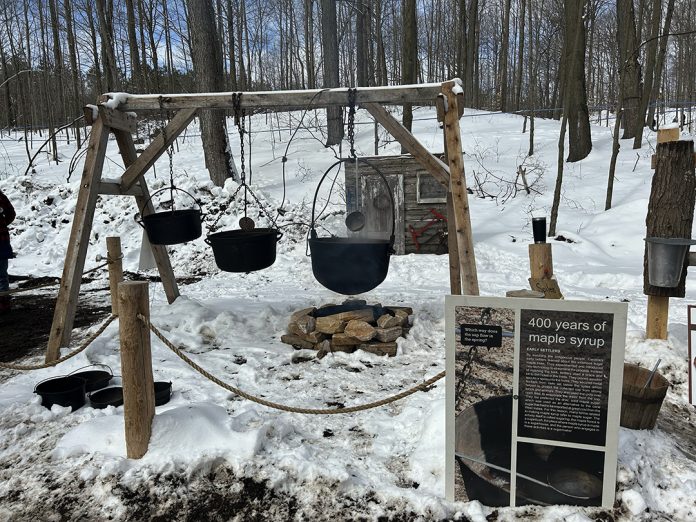Residents from Durham Region and beyond are making the trek to north Oshawa for afternoons of fun and exploration, all united by their love for a Canadian staple – maple syrup.
The annual Purple Woods Maple Syrup Festival made its return on March 10 after being cancelled in 2020-2021. The event is slowly regaining popularity after a successful return last year.
Conducted by the Central Lake Ontario Conservation Authority and hosted at Purple Woods Conservation Area in Oshawa, the festival made a multitude of attractions for all ages.
These included a modern syrup evaporator, educational booths on the cultivation process, horse-drawn carriage rides and of course, pancakes for sale with fresh maple syrup.
After paying $8 for admission, guests are granted access to the Purple Woods trail, where they can embark on self-guided tours of the conservation area.
Once they reached the bottom of the hilly trail, guests could explore the many options provided by the festival. A standout is the free samples of cedar tea, which is brewed on-site.
Located nearby the tea booth was one of the biggest attractions of the festival, the modern wood-fired evaporating system. Guests can line up to see how the machine boiled sap to turn it into maple syrup.
Cathy Grant is a conservation educator for Central Lake Ontario Conservation Authority who was present at the festival. She explained in further detail what the process entails.
“The sap comes in about three per cent sugar and we wanna turn it into around 66.6 per cent. That’s kind of the magic number,” Grant said.
Grant has been working for CLOCA for 30 years. She says that her favourite part of the festival is showing guests how the actual maple syrup-making process takes place.
“It’s not as much fun to try to explain it to somebody when it’s not running,” Grant said, “I think people tend to enjoy it more when it’s actually running in front of them.”
According to Agriculture Canada, the Canadian maple syrup industry accounts for approximately 75 per cent of the world’s maple syrup production with four per cent coming from Ontario.
Guests have the option to attend other events in the area including purchasing the fan-favourite frozen maple syrup taffy or learning about Oshawa’s historic cabins, courtesy of the Oshawa Museum.
Close by is an attraction showcasing how maple syrup was harvested before the automated process we know today. Guy Morey, the maple Syrup program interpreter for this year, explained the process.
Morey, who began working for CLOCA in 1981 after retiring as a teacher, says the best part of the festival for him is deeper than just talking about maple syrup.
“I’ve been a teacher all my life and I just miss just the interactions with kids and continuing teaching,” Morey said. “I’ve taught outdoor ed at three different centers for the Central Lake Ontario Conservation Authority and for the Metro Toronto Region Conservation Authority.”
Guests were also welcome to return to Heritage Hall to order breakfast. Options included pancakes, breakfast sausages, apple cider, coffee and of course, lots of maple syrup.
According to CLOCA, various community groups served the pancakes and beverages and helped with clean-up services. One day of service equated to $300 worth of donations.
Cara Gregory, the conservation education coordinator is responsible for organizing educational tours, outreach and corporate events.
She says that seeing guests enjoying themselves outside in the conservation area is the most rewarding aspect of working the festival.
“I love seeing people outdoors because I think the more people spend time outdoors and they start to get an appreciation for nature, our conservation areas and they start to protect it,” Gregory said.




